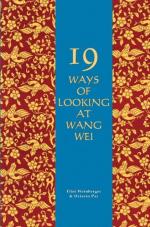|
This section contains 2,698 words (approx. 9 pages at 300 words per page) |

|
SOURCE: "Taoist-Buddhist Elements in Wang Wei's Poetry," in Chinese Culture, Vol. XXX, No. 1, March, 1989, pp. 79-89.
In this essay, Ang examines the role language plays in Wang Wei's poetry and assesses its effect on mood and theme.
My heart has always been serene:
The clear river is equally at peace.
Wang Wei's (701-761) poetry is often characterized by its harmonious and integrated tone. As a poet-painter and devout Buddhist, Wang Wei's poetry presents a concrete natural world not only pictorially but also transcendentally or metaphysically. In other words, he expresses his poems aesthetically and philosophically. These characteristics are particularly apparent in his so-called Buddhist poems as well as in his nature poems. Most of the poems in these two categories are permeated by a sense of Buddhist quietism or Taoist ideal. Thus, in his poetry, he presents not only a strong sense of solitude and emptiness, but also...
|
This section contains 2,698 words (approx. 9 pages at 300 words per page) |

|


